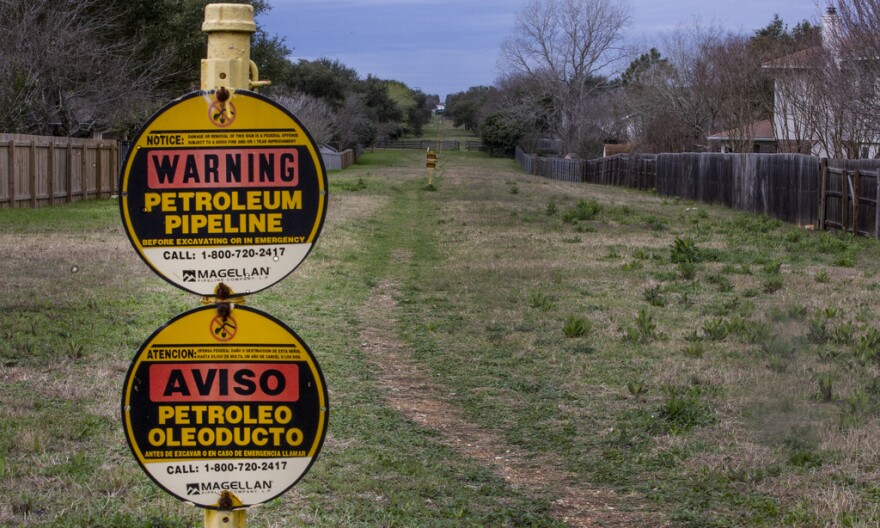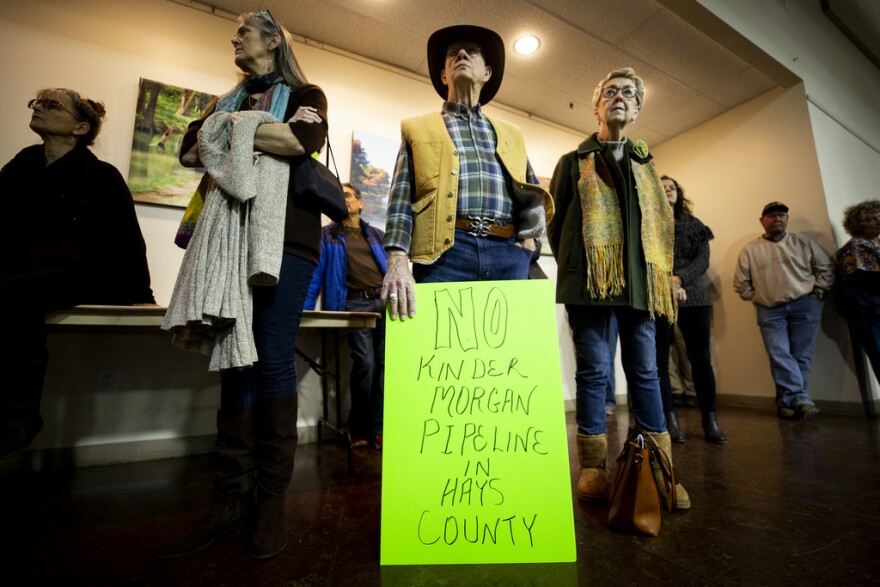Kinder Morgan is hosting an open house in Hays County tonight about its Permian Highway Pipeline, a natural gas pipeline the company plans to run through Central Texas.
As often happens when a Texas pipeline is announced, many people in the project’s path were taken by surprise by the wide-sweeping powers the state grants pipeline companies. With no public engagement process required for routing and building a pipeline here, many residents feel left in the dark about how pipelines work, their potential risks and benefits, and what rights landowners have when it comes to dealing with the company.
That confusion was on display at a pipeline meeting in Wimberley, where residents offered a list of questions about the project that was too long to read aloud, much less answer, before the meeting ended.
Here are some of those questions, with answers from experts in the field.
Why Do Pipeline Companies Have The Power To Take Land?
The biggest battles over pipelines in Texas are fought over eminent domain, a company's power to take land for a pipeline. That power is granted to companies because lawmakers believe they play a role in creating necessary infrastructure that is publicly available.
“One of the ways I try to explain pipeline systems is to say this: When you turn on your gas stove to cook breakfast in the morning, you are literally turning the last valve in a pipeline system that probably starts out in West Texas or in South Texas,” says James Mann, a lawyer and lobbyist for pipeline companies.
"Why should they have the right of eminent domain for the profits of their shareholders?"
The fact that pipelines are so efficient at moving fossil fuels is also what makes them essential to the state’s oil and gas industry. Mann counts that as part of the public benefit that pipelines offer.
But it’s an argument that may be getting harder to make as more of the oil and gas produced in the U.S. is shipped overseas instead of delivered to our cars and stovetops.
“This pipeline, the Permian Highway Pipeline, a very large percentage of that gas – if not all of it – will be for export. Where's the public good in that?” asks Chuck Lesniak, who serves on the Liquid Pipeline Advisory Committee for the U.S. Department of Transportation. “Why should they have the right of eminent domain ... for the profits of their shareholders?”
The argument for a public benefit to oil and gas extraction is also being increasingly challenged by a growing “keep it in the ground” movement, which argues further extraction of fossil fuels will worsen the impacts of climate change.
Are Pipelines Safe?
At the Wimberley meeting, Marilyn and Marvin Zgabay shared a photo of a badly burned 7-year-old girl. It was taken decades ago at their family's ranch in Rosenberg, Texas.

Marilyn’s father had taken her daughter, Lauren, out to his pasture to look at the cows, when a natural gas line running under the property exploded.
The two were separated in the explosion, and when Marilyn's father found Lauren, she was pressed against a barbed-wire fence, but alive.
Zgaybay says she opposes the Permian Highway Pipeline because they've "experienced it." The planned line would run near her property and over her son's land in Fredericksburg.
“We're still in the blast area,” she says.
The likelihood of a pipeline exploding is low, however. Industry often points out that pipelines are the safest and most efficient way to transport oil and gas. Lesniak thinks that may account for some of the leeway given to pipeline companies in planning their projects.
But, he says, he believes the risk of accidents should be given greater weight in regulation and oversight.
“From a probability standpoint, it’s a very low-frequency-risk profile,” he says. “But the consequences are very, very high. Because when you do have an accident, it can be catastrophic because of the very high volumes of product that are transported.”
That’s one of the reasons it’s important to know what is being transported in a pipeline. But that can change from year to year.
What Materials Can Pipelines Carry?
“I think a lot of people who don’t live here near the pipeline don’t know it’s here,” Renae Hicks says on a recent cold afternoon in South Austin.
He's referring to the Longhorn Pipeline, which runs under what he describes as a “highway of grass” that makes up the right-of-way.

Hicks spent part of the '90s fighting this pipeline as a lawyer for landowners. Lesniak did as well, when he worked for the City of Austin. They both say the Longhorn line is a good example of how pipelines change over time.
This pipeline started carrying crude oil from the west in the 1950s.
"Then, in the mid-'90s, it switched from being a crude oil line to what’s called a hazardous liquids line,” Hicks says. "[It transported] jet fuel, gasoline, things like that."
“Then it switched again to being a crude oil line from West Texas to the Gulf Coast,” he says.
Hicks was unable to get the Longhorn rerouted but he did help win concessions from the pipeline company, which replaced part of the line over environmentally sensitive areas.
He says it shouldn’t require lawsuits to bring that level of oversight to the planning process.
"The most obvious problem with pipeline oversight in Texas is they turn the job over to the private pipeline companies and let them choose their route," he says. "There is no control by Texas government with people in Texas having no say at any stage over what route a pipeline can take."
That’s why he’d advise people in Hays County to get as many questions as they can answered both from the company and from their elected officials before construction starts.







